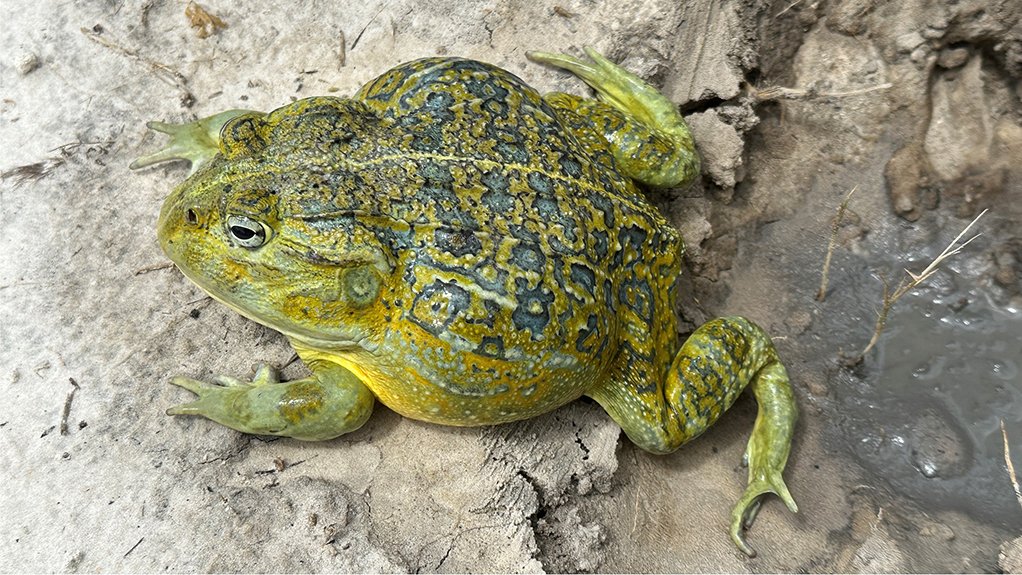New African bullfrog species discovered – the largest discovered in 100 years
North-West University (NWU) Professor Louis du Preez and his team of researchers have discovered a new species of African bullfrog, Pyxicephalus beytelli, which is the fourth species of bullfrog identified in Southern Africa.
The species occurs in parts of northeastern Namibia, southern Angola, southwestern Zambia and northwestern Botswana.
The species is named after the late Ben Beytell, who had been Namibia Parks and Wildlife Management director and who was instrumental in the proclamation of the Khaudum National Park, in Namibia, where the species occurs.
Pyxicephalus beytelli is similar to all other species of bullfrogs in its external structure, internal anatomy and general behaviour.
However, two of the main distinguishing features of Pyxicephalus beytelli are its bright yellow and lime green colouring, blue spots and a white vertebral line running down its body. It also has prominent and somewhat ferocious teeth, which are sloped backwards, or recurved, and two large bony protrusions on the lower jaw.
“Their teeth really stand out, and we are excited to learn more about their feeding habits. This frog has a big bite,” said Du Preez.
Bullfrogs have a varied diet that includes mice, small birds, snakes, insects and even other frogs.
Du Preez and former student Marleen Byron first encountered the bullfrog in the Okavango 12 years ago and realised there was something different about this frog. Du Preez attributes the belated discovery of Pyxicephalus beytelli to its habitat.
“Getting to some of the places where Pyxicephalus beytelli can be found is extremely difficult. These places are remote and you have to cross rough terrain to get there. Also, people simply did not realise that it was a different species.”
In late 2021, Du Preez was commissioned by the Namibian Nature Foundation to conduct a survey of amphibians and reptiles in Khaudum National Park. A thorough and painstaking process then began, in which the specimens collected were carefully detailed and compared with existing known species.
It is the largest frog species discovered in more than 100 years. The largest specimen found is 210 mm long and weighs 1 kg.
Further, from a conservation perspective, the identification of new species is of paramount importance to ensure its protection, he emphasised.
“Frogs evolved about 350-million years ago and have diversified from there. Today, they are the most threatened group of vertebrates in the world. A big reason for this is the destruction of their natural habitat.
“The more we know about a species, such as its location and range, the better we can protect it. It is only when we have caused the extinction of a species that we realise what we have lost. There is still a lot to learn about this new species, and the fun will be in finding out,” Du Preez said.
Comments
Press Office
Announcements
What's On
Subscribe to improve your user experience...
Option 1 (equivalent of R125 a month):
Receive a weekly copy of Creamer Media's Engineering News & Mining Weekly magazine
(print copy for those in South Africa and e-magazine for those outside of South Africa)
Receive daily email newsletters
Access to full search results
Access archive of magazine back copies
Access to Projects in Progress
Access to ONE Research Report of your choice in PDF format
Option 2 (equivalent of R375 a month):
All benefits from Option 1
PLUS
Access to Creamer Media's Research Channel Africa for ALL Research Reports, in PDF format, on various industrial and mining sectors
including Electricity; Water; Energy Transition; Hydrogen; Roads, Rail and Ports; Coal; Gold; Platinum; Battery Metals; etc.
Already a subscriber?
Forgotten your password?
Receive weekly copy of Creamer Media's Engineering News & Mining Weekly magazine (print copy for those in South Africa and e-magazine for those outside of South Africa)
➕
Recieve daily email newsletters
➕
Access to full search results
➕
Access archive of magazine back copies
➕
Access to Projects in Progress
➕
Access to ONE Research Report of your choice in PDF format
RESEARCH CHANNEL AFRICA
R4500 (equivalent of R375 a month)
SUBSCRIBEAll benefits from Option 1
➕
Access to Creamer Media's Research Channel Africa for ALL Research Reports on various industrial and mining sectors, in PDF format, including on:
Electricity
➕
Water
➕
Energy Transition
➕
Hydrogen
➕
Roads, Rail and Ports
➕
Coal
➕
Gold
➕
Platinum
➕
Battery Metals
➕
etc.
Receive all benefits from Option 1 or Option 2 delivered to numerous people at your company
➕
Multiple User names and Passwords for simultaneous log-ins
➕
Intranet integration access to all in your organisation




















